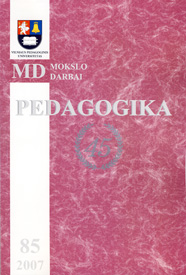Vaikų savaiminio mokymo (si) namų aplinkoje reikšmingumo diskursas
Discourse of Significance of Self-Learning/Teaching of the Children at Home
Author(s): Audronė Juodaitytė, Kristina RūdytėSubject(s): Education
Published by: Vytauto Didžiojo Universitetas
Summary/Abstract: In the arride the self-learning / teaching of the children in a home setting is represented through concepts of the parents like adult experience. Children have adequate conditions for self-learning in a home setting, because they can employ the home setting and communicate freely with the adults and peers. However the adults tend to prefer learning / teaching of the children in a school setting as a formai one when it is going on under teachers' guidance. Learning experience of a child is understood as insufficiently significant for a person's learning development. Adults often reject the concept: "children are competent to manage their learning". Basing on a qualitative research, in the article the parental concepts towards the children self-learning / teaching in a home setting, as those of the adults, are found. The research disdosed that the parents do not think the self-learning of the children in a home setting to be meaningful for the child, suggesting the formai learning according to the school tasks. This is the way for the parents to eliminate the learning-favourable conditions from the home setting. It is disclosed that in order to develop self-learning / teaching of the children it is necessary for the adults to understand this process as significant for the children without assessing it in accordance with the formai school learning / teaching signs. The research disclosed that the parents understand learning of the children in the adult culture and in the context of previously acquired school learning experience, when the learning was going on under teacher's guidance, performing in the given task system. Main source of such learning is a book and not learning from the setting. Parents can understand neither the uniqueness of the children learning culture (investigation, experimenting, spontaneous learning situations etc.) nor its dissimilarity from the adults' one. For summer holidays the children are suggested the learning / teaching models in the home setting, where the parents have a chance to observe and control as well as to participate directly in the learning process. The research led to description of the self-learning discourse of the children in the context of concepts of their parents as adults. Trying to assist the child to learn, the parents little try to involve the child or relate children learning participation with their own participation or apply the inducement-punishment system and control. Parents orient towards necessity of their assistance for the children as well as the direct assistance forms. Therefore they do not distinguish importance of parental consultation or advise, understanding activity of the child in selecting the forms, contents, sources as an obstade for learning instead, however in categorizing the impediments for children learning, the parents distinguish the following sensual context: "lack of sensible learning skills". ..
Journal: Pedagogika
- Issue Year: 2007
- Issue No: 85
- Page Range: 135-145
- Page Count: 11
- Language: Lithuanian

